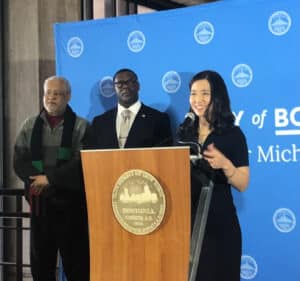
Boston Mayor Michelle Wu announces a new task force to monitor developers' compliance with the city's fair housing zoning ordinance at Boston City Hall on April 1, 2022. Photo by Steve Adams | Banker & Tradesman staff
As Boston implements its year-old fair housing zoning, Mayor Michelle Wu is creating a committee to measure its effectiveness in limiting displacement by development and gentrification.
The ordinance, the first in a major U.S. city, is designed to prevent displacement and inequitable effects on minority populations because of development.
At a ceremony marking the anniversary of the 1968 federal Fair Housing Act, Wu said City Hall department heads will issue quarterly reports on effects of development on communities.
“I am not happy with the levels of affordability we are seeing [in new developments],” Wu said. “We clearly have seen that in the Census numbers and housing prices.”
Wu previously appointed a study committee to consider raising the minimum percentage of income-restricted units in multifamily developments, currently 13 percent, under the city’s inclusionary development policy.
The federal law bans discrimination in housing based upon protected classes such as race, gender identity and disability.
In 2020, Boston City Councilors Lydia Edwards and Kenzie Bok pushed for the zoning amendment, which requires city boards to consider effects on minority communities when reviewing new developments.
Based upon the history of displacement and discrimination in specific neighborhoods, developers can be required to include a higher percentage of affordable units than the minimum, or include lower median household incomes to buy or rent affordable units.
Developers also are required to include diverse populations in their marketing strategies.
“When we take into account the impacts of development and giving out approvals, the impact of destabilization of communities is firmly included in the analysis,” Wu said.
The changes could affect the shape of large projects under review including the 6.5 million-square-foot Dorchester Bay City, which proposes nearly 2,000 housing units along with office, lab and retail space.
James Jennings, a professor emeritus at Tufts University, said the new law puts Boston in the forefront of housing policy.
“For the first time, powerful corporate interests can no longer be the handmaiden of gentrification,” Jennings said.




 |
| 



